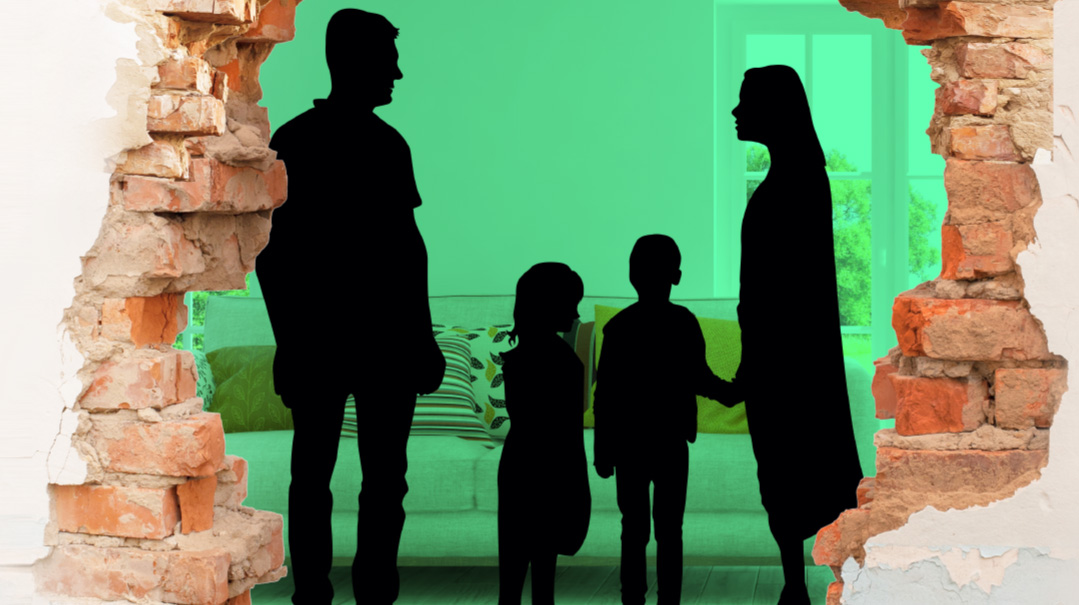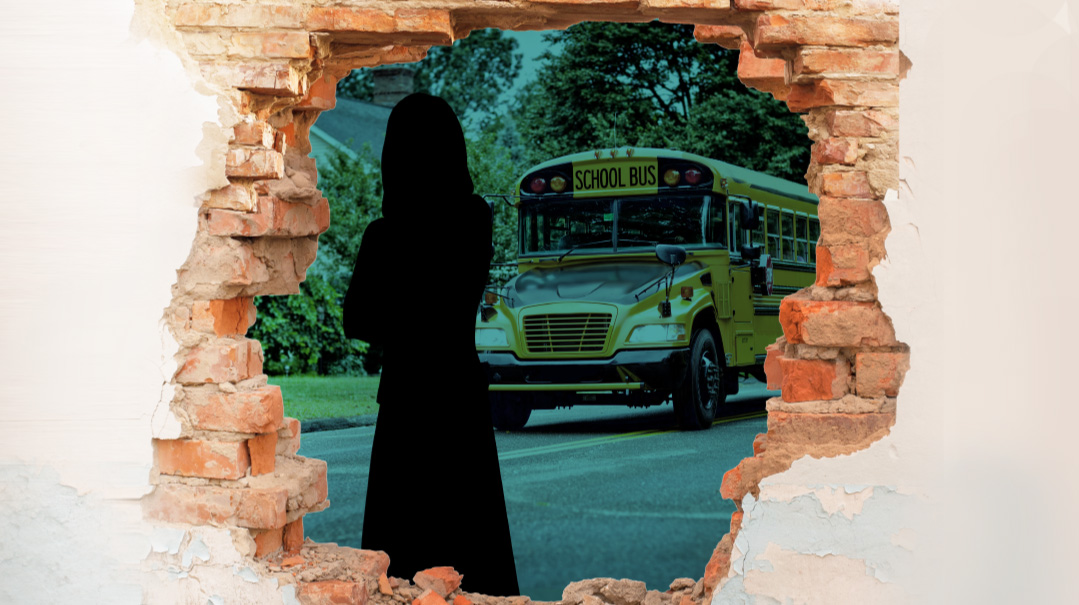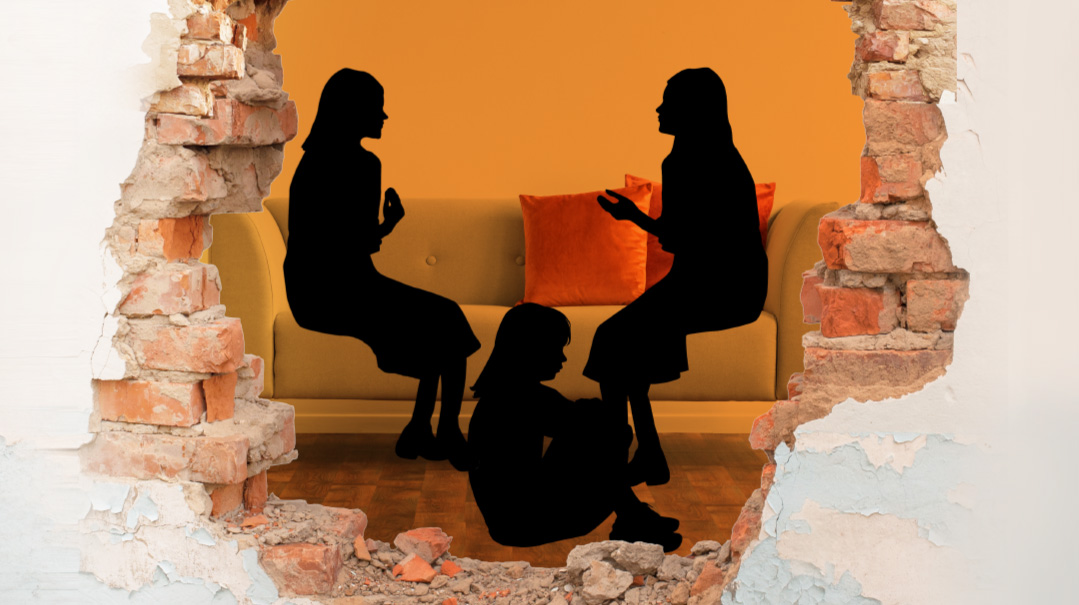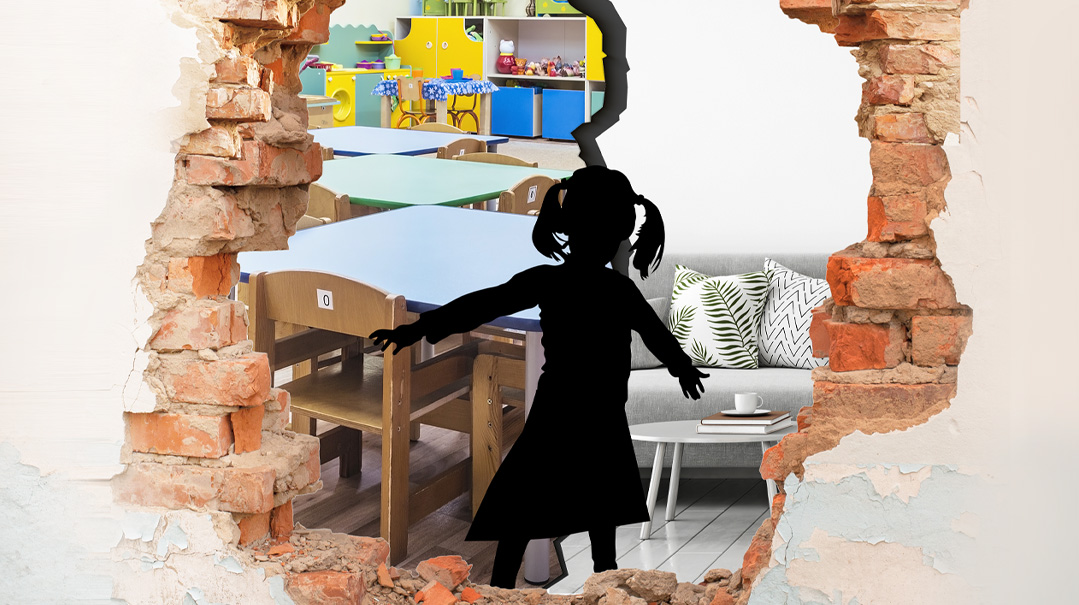“My Husband’s Changing — and I’m Not on Board”

“It’s important to realize that he, like you, is a work in progress”

Moderated by Faigy Peritzman
When I first got married several years ago, my husband was a top guy in his chaburah — really serious about his learning and shemiras hamitzvos. I was completely on board with his dedication to minyan and his sedorim, and his dikduk b’halachah. This is what I wanted for myself and my family.
We have a few children by now, and I can pinpoint exactly when things started changing. When we had our third kid, I needed more of my husband’s help, which he gladly provided. He started davening at a later minyan to be able to help me get the kids out in the morning. A few weeks later, after things started falling back into schedule, I told him I’d be okay if he wanted to switch back to his regular minyan. But he brushed me off, saying he really liked the guys in the new shul and really connected to them.
Things started spiraling downward from there. The “new guys” may have been nice people. but they certainly didn’t share my husband’s learning ethic or tight schedule, and I started noticing how much later he was going to yeshivah. Then he began to daven Maariv in this new shul as well. Maariv often stretched out to a “deep schmooze” as my husband described it, and he’d come home all pumped about “loving mitzvos as opposed to just living mitzvos.”
These thoughts may ring true in a solid mussar shmuess, but somehow sounded full of air when I wasn’t seeing any growth in avodas Hashem based on this approach. At the Shabbos seudos he shares new niggunim as opposed to new chiddushim. While I’m not against any of these practices alone, it just seems to me he’s become happy and enthusiastic about slogans and phrases, without anything to show for it in his shemiras hamitzvos.
What happened to the serious boy I married? I’m finding it harder and harder to relate to him and even to respect him. And I’m worried how this will impact our kids. They’re getting old enough to pattern themselves after their father’s behavior, and this is not the atmosphere I ever expected, nor do I appreciate it in my home.
Rabbi Ilan D. Feldman has served as the rav of Beth Jacob of Atlanta, Georgia since 1991.
You and your husband are clearly committed to creating a home built on the foundation of talmud Torah and careful observance of mitzvos. It’s very difficult when someone changes the rules of the game without discussion and prior notice. You count on your husband to provide leadership in that area, and he seems to have shifted significantly from your original model. And let’s be clear: there is no more noble enterprise in Am Yisrael than the diligent immersion in limud HaTorah with passion and discipline. You are to be admired for striving for that standard.
This is a delicate situation, and it requires a thoughtful and measured response. It’s not a black-and-white, right-and-wrong situation, such as when chas v’shalom a spouse gives up mitzvah observance. In this nuanced situation — and I know this sounds ominous — you can make the situation worse if you aren’t careful.
Your disappointment is legitimate and understandable, and the best approach available to you will not come naturally, and will seem counterintuitive. But the truth is that the dilemma you’re confronting represents an opportunity for personal growth and for growth in your marriage.
Let’s be clear about what you are contending with. Your husband has not said that he is uninterested in talmud Torah, or that he is no longer interested in davening with a minyan. Nor has he suddenly developed a lack of interest in enhancing the Shabbos table experience. He has become fueled by newly discovered avenues of spiritual self-expression that he didn’t always have while he was focused diligently on learning, while shedding some of his punctuality and structure.
Until your husband encountered this new approach, he expressed his devotion to Yiddishkeit in the one model he knew, as the true eved Hashem he is. But when he discovered other avenues of expression, they reached his neshamah in ways he never would have expected. His rigorous involvement in the discipline of Torah study was sincere and carried him spiritually through his younger years, but he may need something else at this stage of life.
It’s important to realize that he, like you, is a work in progress. What you see now is not his “final answer.” He is likely going through a form of delayed religious adolescence, finding and discovering different aspects of himself, something not uncommon as people transition from bochur to married to leader of a family. If he is given trust and the space to explore, it’s likely his youthful commitment to talmud Torah will eventually be integrated with his newfound interests.
Your husband craves your admiration and respect. Trust is the most potent tool you have to positively affect your husband’s religious behavior.
Trust, by definition, means having faith in someone even when he takes a fork in the road you might not have taken. If you withdraw your trust because you’re concerned about his newfound ruchniyus interests, you will drive him away. Now is the time for you not only to outwardly show respect, but internally to develop a respect for who he is, no matter how he goes about his service of Hashem. Let him know you respect him for expanding his religious horizons. For all you know, zemiros at the table might inspire the children more than chiddushim. What is important is not how your husband is displaying initiative, but that he is at all. I’m sure he craves your admiration and approval for this, and, should he find that missing, the result will be distance, not a “return to chiddushim.”
I don’t suggest you give up on your dreams for your household. A husband generally strives to be accomplished in areas he perceives are important to his wife, but only if he sees his wife as a partner. Your husband has not finished growing. Growth in ruchniyus is not predictable, and sometimes leads one into unexpected areas. When he finds himself in an environment in which he feels respect, admiration, and trust, this will spur his growth. Rather than stand apart as a worried observer, join him as a partner who cherishes talmud Torah and still trusts his leadership.
Debbie Selengut is a veteran kallah teacher in Passaic, New Jersey.
This question really grabbed me, as within the offshoots of this dilemma is a core question that 90 percent of women have. Essentially, you can fill in the blank with any variation of this main overriding question: My spouse has changed. Now what? This isn’t the person I married.
(Looking back, you’ve probably changed, too; you’re not the same person you were when you got married. But we’re so much more ready to accept our own changes than those of our spouse.)
There are so many possibilities within this question, so with your permission, I’d like to address it as a broader question, rather than this specific dilemma.
I had a woman come to me who was “very disappointed in her life.” She was about 35 years old and that’s how she described her issue. When she was dating her husband, they had discussed what they were going to do in life. They planned to do kiruv, move to a college campus, and change the world. And now they were living in the Tristate area and her husband was a professional. “This wasn’t supposed to be my life,” she said to me in all seriousness.
I tried to think of something eloquent to tell her, but the thought that kept popping up in my mind was a bare-bones, This is your life right now, and yes, you did not expect it to look like this. Now what are you going to do?
When faced with change, a person has a choice. They can mourn the loss, or move forward. This isn’t to say there’s no room for sadness. One definitely needs to validate the sense of loss when this happens. The question is what happens next.
The woman who came to see me was mourning the loss of the visions she and her husband aspired to when they were young. The woman who wrote this letter is mourning the loss of the idealism and lifestyle she had so respected in the beginning of their marriage. And any woman whose life turns out differently than she had hoped, may be mourning the loss of her dreams. It’s important to acknowledge that. Loss is painful. And in the back of the mind, one may always wish for what could have been.
But having said that, once you’ve processed and accepted the loss, you can figure out how you’re going to go forward. Being able to talk this through and receive validation for your feelings is often a helpful step, but it’s only a step. And it’s possible to get so lost in validation that one may not feel a need to change. You can talk about your feelings with a mentor or a sister, but don’t get stuck there.
Success in life is not about recreating what once was. It’s what we do with what we were given. We don’t write the script of life. Our job is just to read the part we’re assigned.
Our challenge is not the choices we think are ours to make. Our challenge is what we choose to do with what Hashem gives us. Your challenge isn’t to remold your husband; it’s to make a beautiful home given the changes in the circumstances, investing your energy into making a home of simchah and serenity. And the commitment to do so can only come when you’re in a place of acceptance, not anger or resentment.
When dating, obviously it’s important to have conversations and set priorities, while recognizing that these are just starting points, directions to face. Then life happens. If a person can’t go with the ebb and flow of life, if they remain rooted in their dreams, it robs them and their family of happiness and of all of the beautiful possibilities that the new reality can bring.
There are things in life we can control and there are things we cannot control. This change you speak of is happening; it’s not going away. It’s out of your control.
What you can control is your reaction to it, and your family will observe and internalize your acceptance, love, and emotional regulation.
I can’t think of a better lesson to model.
Mrs. Shira Francis is a licensed marriage and family therapist in private practice in Chicago, Illinois. She specializes in intimacy-related issues and trauma, and she educates and trains on these topics as well.
The letter writer is addressing a real phenomenon that often occurs in adult life. A couple may have chosen to marry based on shared goals and beliefs, but the reality of life is that adults are still growing. As they take on new roles, navigate transitions, and have varied experiences and exposure to others, they often will change. While many people mistakenly assume that they and their spouses will remain the same as they navigate their journey through adulthood, this isn’t the case.
There are many factors that can contribute to the changes and shifts that people experience as adults. Nisyonos such as illness, infertility, struggles with parnassah, and adjustment challenges can affect a person in ways that are unpredictable at the start of marriage. Sometimes, while there may not be an acute or obvious struggle taking place, people will still be drawn to different styles and hashkafos in avodas Hashem, depending on their personalities, upbringing, and coping strategies. Since we aren’t finished products when we get married, it is to be expected that there will be unpredictable shifts that take place for both husband and wife, and at times these shifts might be more disturbing than others.
For example, a husband might be disappointed that as time goes on, his wife gravitates toward materialism, and her focus on gashmiyus becomes more prevalent than it was when they got married. A wife might be disappointed that after some time, her husband wants to leave full-time learning earlier than he thought he would when they got married. While we marry with an assumption that our compass is pointed in a given direction, there is no guarantee that this direction won’t change over time.
In this letter, there is no indication of the husband doing things that are assur. Rather, he has shifted his style of avodas Hashem to one that is more “hartzig” — and in many ways more laid-back — than his style was before. I have heard from daas Torah that if differences emerge between a couple after they get married, they are supposed to find compromise between their different styles, provided halachah is not being transgressed and the children are not being exposed to things that are too complicated for them to process.
This isn’t to say it won’t be difficult. A spouse can experience their spouse’s shift in hashkafah as a betrayal of sorts, a deviation from the joint “script” they agreed to when they married. In this case, the wife might rightfully grieve the loss of certain dreams, expectations, and standards that she envisioned for her home. Grieving includes denial, anger, disbelief, and sadness. Working through these phases can be painful, but ultimately, the goal is for this wife to respect her husband for the person that he is, despite his shift in avodas Hashem.
Acceptance is not a contradiction to finding compromise. It’s not clear from the letter if the wife has broached these topics with her husband, but if she hasn’t, I would recommend that she does. Building a family requires communication and collaboration, and there is no need to remain silent about circumstances that are unsettling. The key to success though, will be the method of communication that she uses.
If a wife attacks her husband with accusations and derogatory statements, he will “pick up his shield” and focus his energy on self-defense. A more effective approach for a wife is to speak to her husband about her own feelings — meaning, talking about herself as opposed to talking about him. The wife may say to her husband, “It would mean so much to me to hear a devar Torah from you during the Shabbos seudah,” and “It makes me so happy when the boys leave to shul with you on time.”
By talking about herself and her feelings, she can make a meaningful request instead of a critical comment, which is more likely to be accepted by her husband, if offered in a calm, gentle tone.
It might be interesting to consider that childhood experiences often surface during adult life transitions. Many parents relive aspects of their childhood — consciously or subconsciously — when they start to raise their own children. In this case, the husband has shifted to a more emotion-based flavor of avodas Hashem. We might wonder if this is an aspect that he felt was lacking for him in the past.
As with every marital concern, a couple should try their best to communicate respectfully and negotiate compromise. However, if they aren’t successful, a competent mentor, rav, or professional should be consulted.
(Originally featured in Family First, Issue 834)
Oops! We could not locate your form.







